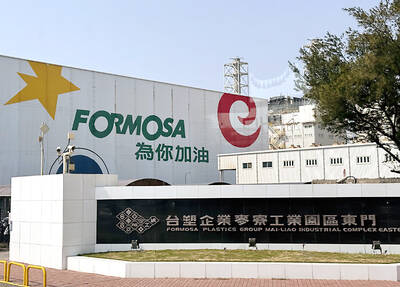Business groups yesterday lambasted the government’s latest move to grant the nation’s employees a four-day break for the New Year holiday at the start of next month, saying that the sudden decision would increase costs for many companies.
“Many of our member export companies complained that making Jan. 2 [Friday] a mandatory holiday will mess up their shipment schedule,” Jason Fong (馮志良), deputy secretary-general of the Chinese National Federation of Industries (CNFI, 工總), said yesterday by telephone.
Now that a four-day break must include a Friday, these companies will have to bring their shipment schedule forward to Tuesday, Dec. 30 since only Tuesdays and Fridays are available for exporters to declare their outbound shipments at customs, he said.
That means that exporters with a tight schedule will have to hire extra hands or ask employees to work overtime to meet the delivery, which adds unnecessary costs to businesses already operating with a thin profit margin, he said.
Fong said the CNFI had advised the government to offer more flexibility by allowing businesses to decide, in accordance with their own working schedules, whether they can make Jan. 2 a holiday, a request the government appeared to ignore.
Roscher Lin (林秉彬), chairman of the National Association of Small and Medium Enterprises (中小企業協會), agreed.
The association’s secretary-general, Paul Wang (王振保), yesterday quoted Lin as saying that the government’s sudden decision curried favor with legislators, but “put a burden on businesses suffering from an economic slowdown.”
On Tuesday, under pressure from legislators across party lines, the Cabinet’s Central Personnel Administration made Jan. 2 a holiday on the grounds that people would take advantage of the four-day vacation to travel or shop, which would help boost the nation’s economy.
Shares of hotel and recreation stocks rose yesterday as investors welcomed the holiday news.
“The assumption is that consumers will be more likely to get out of the house and spend more money,” SinoPac Securities Corp (永豐金證券) said yesterday in a note to investors.
Shares of Formosa International Hotels Corp (晶華國際酒店) rose 6.2 percent to close at NT$256 while those of Ambassador Hotel Ltd (國賓) climbed 4.3 percent to NT$29.3.
But other business leaders saw the government’s decision as not having a great effect on slowing business.
Wang said that since orders had been cut at some small and medium businesses, some employees had been asked to take unpaid vacations amid the recent economic meltdown.
The administration’s decision would not affect these firms so much since employees will make up their working day the next Saturday, Jan. 9, he said.
Luo Huai-jia (羅懷家), executive director of Taiwan Electrical and Electronic Manufacturers’ Association (電電公會) also took a neutral stance.
He said that most electronics companies have no choice but to accept the government’s decision and would map out contingency plans for their schedules since there would be only one additional day off.

EXTRATERRITORIAL REACH: China extended its legal jurisdiction to ban some dual-use goods of Chinese origin from being sold to the US, even by third countries Beijing has set out to extend its domestic laws across international borders with a ban on selling some goods to the US that applies to companies both inside and outside China. The new export control rules are China’s first attempt to replicate the extraterritorial reach of US and European sanctions by covering Chinese products or goods with Chinese parts in them. In an announcement this week, China declared it is banning the sale of dual-use items to the US military and also the export to the US of materials such as gallium and germanium. Companies and people overseas would be subject to

Taiwan Semiconductor Manufacturing Co (TSMC, 台積電) founder Morris Chang (張忠謀) yesterday said that Intel Corp would find itself in the same predicament as it did four years ago if its board does not come up with a core business strategy. Chang made the remarks in response to reporters’ questions about the ailing US chipmaker, once an archrival of TSMC, during a news conference in Taipei for the launch of the second volume of his autobiography. Intel unexpectedly announced the immediate retirement of former chief executive officer Pat Gelsinger last week, ending his nearly four-year tenure and ending his attempts to revive the

WORLD DOMINATION: TSMC’s lead over second-placed Samsung has grown as the latter faces increased Chinese competition and the end of clients’ product life cycles Taiwan Semiconductor Manufacturing Co (TSMC, 台積電) retained the No. 1 title in the global pure-play wafer foundry business in the third quarter of this year, seeing its market share growing to 64.9 percent to leave South Korea’s Samsung Electronics Co, the No. 2 supplier, further behind, Taipei-based TrendForce Corp (集邦科技) said in a report. TSMC posted US$23.53 billion in sales in the July-September period, up 13.0 percent from a quarter earlier, which boosted its market share to 64.9 percent, up from 62.3 percent in the second quarter, the report issued on Monday last week showed. TSMC benefited from the debut of flagship

TENSE TIMES: Formosa Plastics sees uncertainty surrounding the incoming Trump administration in the US, geopolitical tensions and China’s faltering economy Formosa Plastics Group (台塑集團), Taiwan’s largest industrial conglomerate, yesterday posted overall revenue of NT$118.61 billion (US$3.66 billion) for last month, marking a 7.2 percent rise from October, but a 2.5 percent fall from one year earlier. The group has mixed views about its business outlook for the current quarter and beyond, as uncertainty builds over the US power transition and geopolitical tensions. Formosa Plastics Corp (台灣塑膠), a vertically integrated supplier of plastic resins and petrochemicals, reported a monthly uptick of 15.3 percent in its revenue to NT$18.15 billion, as Typhoon Kong-rey postponed partial shipments slated for October and last month, it said. The